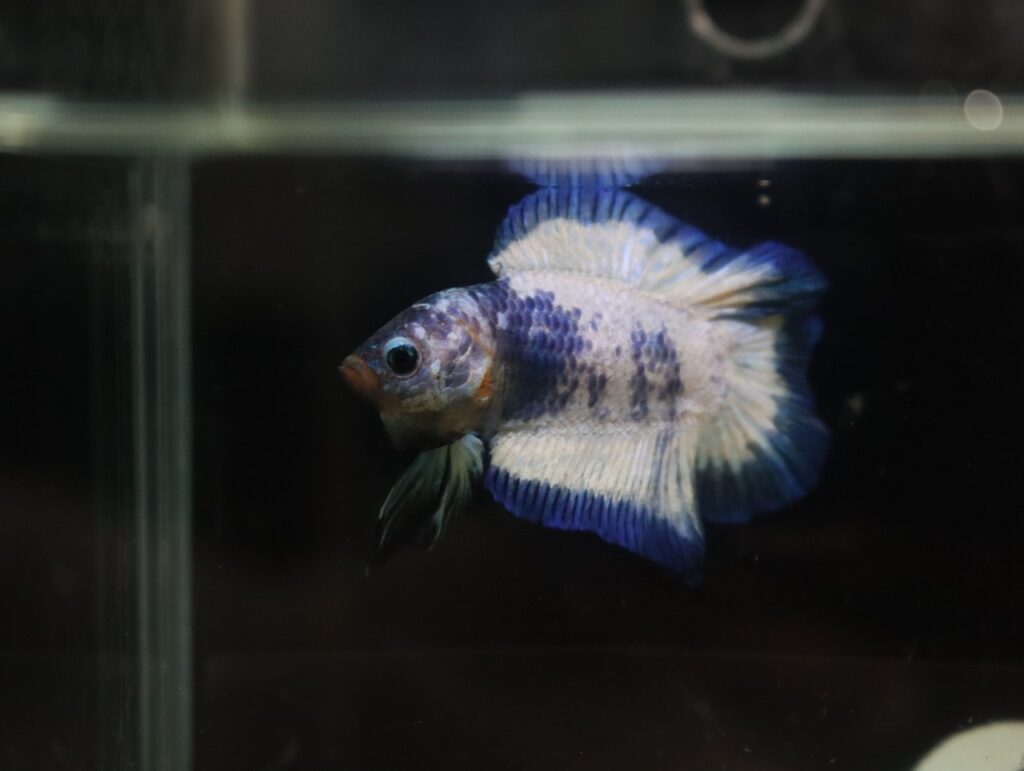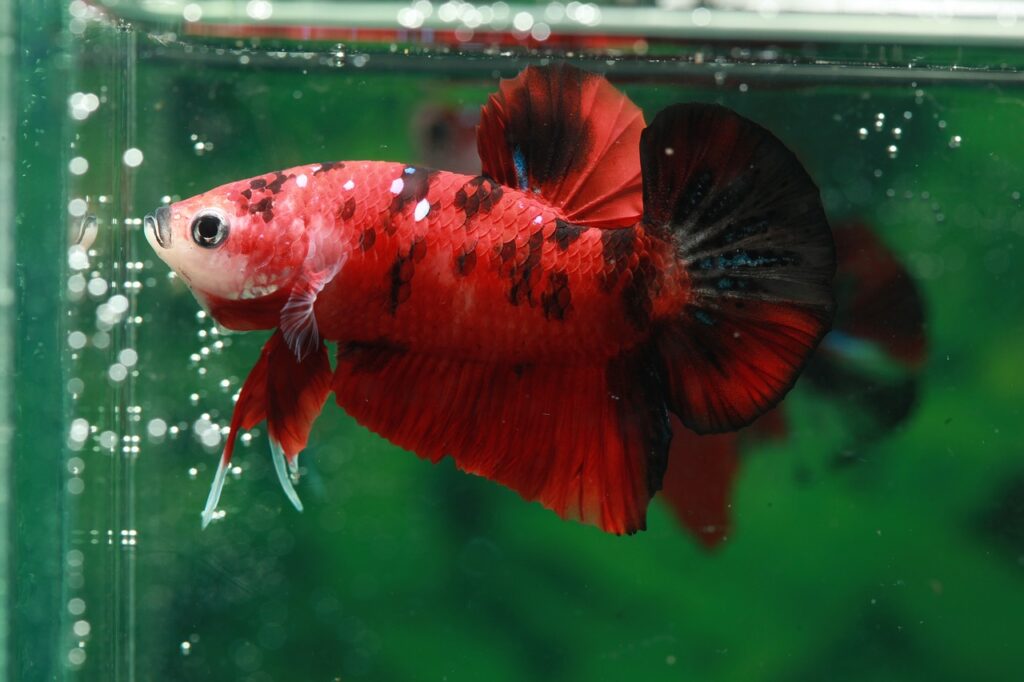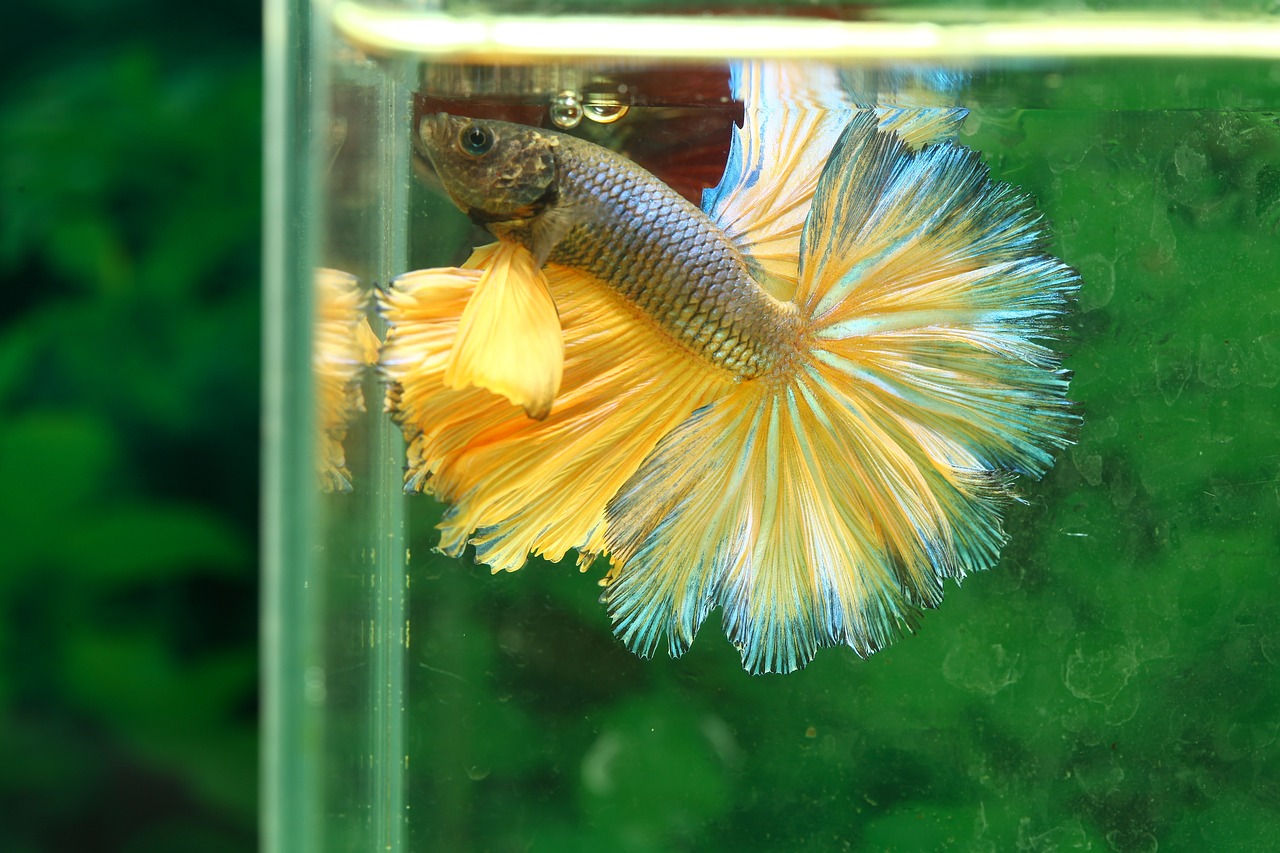Hey there, Betta enthusiasts! While preparing dinner the other night, a piece of spinach caught my eye and made me ponder, “What can betta fish eat of human food?” 🐟✨ It’s a thought that’s popped up more times than I can count, especially when my little Betta buddy, Finn (yes, pun intended), stares at me with what I like to call his “feed me” face. Seriously, those eyes can melt any heart!
Now, we all know that Bettas have their diet intricacies. They’re not just about flaring those beautiful fins; they’re also particular about their munchies. But what if, just what if, there were tidbits from our kitchens they might relish as a once-in-a-blue-moon delicacy? It’s an enticing thought, right?
Hold onto your nets because we’re about to dive deep into this topic; trust me, it’s a fun-filled exploration.
Grab your snorkels, everyone; it’s time to explore the delicious mysteries of our kitchens, Betta-style.
Natural Diet in the Wild
Alright, before we dive into our kitchen cabinets, let’s take a quick detour to the natural habitats of our Betta buddies. Have you ever wondered what they munch on when they’re out in the wild and not showing off in our tanks?
1. Insects and Larvae: Oh yes, Bettas are insectivores at heart! From tiny mosquitoes buzzing around to their juicy larvae wiggling underwater, Bettas are experts at snapping them up. This is one of the reasons they often swim near the water’s surface – they’re waiting for a tasty insect treat to venture too close.
2. Small Crustaceans: Believe it or not, your Betta’s natural menu might include mini shrimp or water fleas. Small crustaceans provide protein and a little crunch (well, in fish terms) for our little hunters.
3. Worms No, not the garden ones you might find after rain! We’re talking about teeny, aquatic worms that wriggle through freshwater habitats. Whether it’s the thread-like nematodes or the meaty bloodworms, they’re all up for grabs in a Betta’s diet.
You might be thinking, “Okay, but my Betta’s not in a rice paddy or stream right now.” Fair point. But understanding their wild diet gives us clues about what our Betta buddies might enjoy and what’s healthy for them. As we explore the potential human foods for Bettas, let’s remember: variety is the spice of life, but some spices (like our human foods) should only be used sparingly!

The Ideal Diet for Your Captive Betta
Okay, so now that we’ve taken a fascinating trip into the wild world of Bettas, let’s swim back to our living rooms or wherever your Betta’s cozy tank resides. In captivity, things are, of course, a tad different. Our fishy friends aren’t hunting down their meals in sprawling rice paddies or intricate streams. Instead, they rely on us to serve them a buffet in their tanks. So, what’s on the menu?
1. Commercial Betta Pellets: These little power-packed morsels are a staple. They are explicitly designed for Bettas and contain all the essential nutrients our colorful companions need to thrive. They’re balanced, easy, and efficient. A tip: always opt for high-quality brands since they usually contain better ingredients that mimic a Betta’s natural diet. And, as with human food, fresher is always better!
2. Frozen or Live Bloodworms, Brine Shrimp, and Daphnia. Want to see your Betta do a happy dance? Offer them some of these treats! Bloodworms are like the gourmet chocolates of the Betta world – irresistible. Brine shrimp and daphnia? Think of them as the fishy equivalent of a juicy steak or a crispy salad. While live foods can add an enriching hunting experience, frozen versions are just as nutritious and minus the risk of carrying any diseases.
While these are the primary foods you’d want to stock up on, switching things up a bit is always fun (and sometimes beneficial). As with us, a change in menu can be delightful. After establishing a primary diet for your Betta, why explore some occasional human food treats? But always remember: moderation is key! Don’t get too carried away tossing tidbits into the tank. Let’s keep things balanced and ensure our aquatic buddies stay happy and healthy!
What Can Betta Fish Eat Of Human Food
Alright, now for the fun part! Picture this: You’re having a meal, and those big Betta eyes watch you, almost begging, “Can I have a bite of that?” Let’s navigate this tantalizing terrain of human foods and find out which ones can make a surprise appearance in your Betta’s diet. Remember, these are occasional treats and shouldn’t replace their regular diet.
1. Cooked Peas
- Why They’re Great: These green gems are fibrous wonders. Not only can they aid digestion, but they’ve also been known to help with Betta constipation – a common issue with our finned friends.
- The Perfect Preparation: Boil them up until they’re soft and mushy. Remove the outer skin, ensuring only the soft inner part remains. Mash or break into tiny Betta bite-sized pieces. Remember, it’s just a treat, so a tiny portion goes a long way.
2. Cooked Spinach and Lettuce
- Why They’re Great: Packed with essential vitamins and minerals, these greens can occasionally boost nutrients. Spinach, in particular, carries iron, magnesium, and beneficial antioxidants.
- The Perfect Preparation: Blanch these greens to make them soft and easily digestible. Once cooled, finely chop or tear them into manageable Betta bites.
3. Rice
- Why It’s Great: A gentle carbohydrate source, Bettas can easily digest rice, providing quick energy.
- The Perfect Preparation: Opt for white rice, cooking it until soft. Then, take a grain or two, ensuring they’re free from added salt or spices, and pop it into your Betta’s tank.
4. Hard-boiled Egg Yolk
- Why It’s Great: Egg yolks are a dense source of protein and vitamins. While it might seem unusual, this treat can give your Betta energy and vitality.
- The Perfect Preparation: Once your egg is boiled and cooled, crumble a minuscule piece of the yolk – think the size of a pinhead. Ensure it’s evenly dispersed in the tank to prevent overfeeding.
5. Small Bits of Seafood (like shrimp or fish)
- Why They’re Great: These can replicate the natural protein sources Bettas would encounter in the wild. Offering seafood can enhance their color vibrancy and overall health.
- The Perfect Preparation: Cook your chosen seafood thoroughly, ensuring it’s plain with no added seasonings. Chop into fine, tiny bits suitable for Betta consumption.
Pro Tip: Always monitor your Betta when introducing any new food, human treats included. Their behavior and poop (yes, fish poop is essential!) can tell you a lot about how they handle the new food. Suppose you notice any signs of distress or digestive issues. In that case, it’s a good idea to revert to their regular diet and consult with a fish expert.
So, next time you’re rustling up something in the kitchen, you might have the ingredients for a delightful Betta surprise. Happy feeding!
Things to Avoid
So, we’ve whipped up some Betta-approved treats from our kitchen, but let’s pump the brakes for a second. There’s a flip side to this culinary coin! Just as some human foods are safe in moderation for our Betta buddies, others are no-nos. Here’s a list of what to dodge, ensuring our vibrant little friends swim solid and healthy.
1. Salty Foods
- Why They’re Bad: Bettas aren’t fans of the salt life. High salt levels can lead to severe health issues like bloating, dehydration, and kidney damage.
- What to Remember: Always ensure any food from your kitchen is free from added salt before offering it to your Betta.
2. Oily or Greasy Foods
- Why They’re Bad: Oily foods can lead to digestive issues and might even cloud your tank’s water, making it an unsuitable environment for your Betta.
- What to Remember: Stick to natural, unprocessed foods. Anything deep-fried or cooked in oil should stay on your plate, not in the tank.
3. Foods with Spices, Herbs, or Garlic
- Why They’re Bad: While we love a dash of spice or a hint of garlic, these can cause gastrointestinal disturbances or allergic reactions for Bettas.
- What to Remember: Always keep it simple. “Plain” is the keyword when giving your Betta human food treats.
4. Sweets and Chocolates
- Why They’re Bad: Betta fish don’t have a sweet tooth. Sugary foods or chocolates can be potentially toxic to their digestive system.
- What to Remember: Save the sweet treats for yourself!
5. Dairy Products
- Why They’re Bad: Bettas are not equipped to digest lactose. Offering dairy can result in bloating, indigestion, and other health complications.
- What to Remember: Milk, cheese, and yogurt should be kept far from your Betta’s diet.
6. Caffeinated Beverages or Foods
- Why They’re Bad: Caffeine can be toxic to Bettas, affecting their heart rate and causing undue stress.
- What to Remember: No sharing your morning coffee or chocolate treats with your finned friend!
7. Alcohol
- Why It’s Bad: This should go without saying, but alcohol is a complete no-go. It’s toxic and can have disastrous effects on a Betta’s health.
- What to Remember: Keep any alcoholic beverages or foods containing alcohol away from your fish tank.
Final Thoughts: While sharing a snippet of our culinary world with our Betta is appealing, always prioritize their health. Offer treats cautiously and sparingly; when in doubt, it’s best to stick to their regular diet or consult a Betta expert. After all, our primary goal is to keep those vibrant fins flapping joyfully for a long time!
Benefits of Offering Human Foods Occasionally
You might ask yourself, “Why even venture into the realm of human food for Bettas if they have their staple diet?” As we benefit from the occasional change-up in our meals, Bettas can, too. Let’s dive into some perks of occasionally integrating human foods into your Betta’s diet.
1. Nutritional Variety
- Why It’s Beneficial: Like us, Bettas can benefit from a varied diet, exposing them to different nutrients and minerals they might not get from their regular food.
- What to Know: Offering occasional human food treats can supplement gaps in their primary diet, potentially leading to improved health and vitality.
2. Mental Stimulation
- Why It’s Beneficial: Bettas are curious creatures. Introducing a new type of food can be an exciting adventure for them, keeping them mentally stimulated and engaged.
- What to Know: Watching how your Betta reacts to new foods can also be a window into their behavior and preferences.
3. Enhancing Color Vibrancy
- Why It’s Beneficial: Some human foods, rich in specific nutrients and antioxidants, can boost the natural coloration of your Betta, making them even more dazzling.
- What to Know: Foods rich in carotenoids, like certain vegetables, can be particularly effective.
4. Digestive Health
- Why It’s Beneficial: Occasionally, offering foods like cooked peas can help promote better digestion and act as a gentle laxative for Bettas, preventing constipation.
- What to Know: It’s essential to offer these in moderation. While they can help with digestion, overfeeding can have the opposite effect.
5. Natural Behavior Encouragement
- Why It’s Beneficial: Bettas have a varied diet in the wild. By introducing different food types, you mimic their natural feeding habits, allowing them to exhibit instinctual behaviors.
- What to Know: Observe how your Betta hunts or interacts with the new food. It’s a delightful sight to see them behave as they would in their natural habitat!
6. Building Trust and Interaction
- Why It’s Beneficial: Sharing treats can be a bonding experience. Over time, your Betta might recognize feeding times as interaction times with you, fostering trust and familiarity.
- What to Know: Be patient. Building trust takes time, but the rewards of a more interactive and trusting Betta are worth it!
In Conclusion, Venturing into the world of human foods for your Betta isn’t just about offering a tasty treat. It’s about enriching their lives, providing variety, and fostering a deeper connection with your aquatic companion. As with everything, moderation is essential, and observing your Betta’s reactions will guide you on this culinary journey. So, the next time you’re peeling that pea or boiling an egg, remember you might just be prepping a special treat for your colorful friend!

Precautions When Feeding Human Food
So you’re all set to become the Gordon Ramsay of the Betta world, huh? Before you whip out the apron and the mini fish-sized forks, let’s hit the pause button. As with anything we do for our pets, there are precautions to consider. You want this to be a fun experience for your Betta, not a trip to the fishy ER. Here’s what you should keep in mind:
1. Moderation is Key
- Why It’s Important: Overfeeding can lead to bloating, indigestion, and poor water quality.
- What to Do: Stick to tiny portions and promptly remove any uneaten food from the tank.
2. Introduce Foods Gradually
- Why It’s Important: Sudden changes in diet can lead to digestive upset.
- What to Do: Start with a tiny amount of the new food to see how your Betta reacts.
3. Monitor for Allergic Reactions
- Why It’s Important: Like humans, fish can also have allergies.
- What to Do: Keep an eye out for signs of distress, including rapid gill movement, and remove the food immediately if you notice any unusual behavior.
4. Ensure Cleanliness
- Why It’s Important: Unsanitary food can introduce bacteria and parasites into the tank.
- What to Do: Always ensure the food is well-cooked and thoroughly washed if it’s a vegetable.
5. No Seasonings or Additives
- Why It’s Important: Spices and additives are bad for Bettas and can cause severe health issues.
- What to Do: Always offer the food in its most natural, unseasoned form.
6. Don’t Replace Their Staple Diet
- Why It’s Important: Human food should only be given as a rare delicacy, not as a substitute for their regular, nutritionally balanced meals.
- What to Do: Make sure their primary diet consists of Betta-specific food that meets their nutritional needs.
7. Observe Post-Feeding Behavior
- Why It’s Important: Observing your Betta after feeding can help you determine whether the food agrees with them.
- What to Do: Monitor energy levels, buoyancy, and waste production to gauge if the treat was a hit or a miss.
8. When in Doubt, Consult an Expert
- Why It’s Important: If you’re unsure whether a particular human food is safe, it’s better to consult with a fish veterinarian or expert.
- What to Do: Many online resources, forums, and even vet services can offer advice tailored to your Betta’s needs.
In Summary: Giving your Betta a taste of human food can be an enriching experience for both of you, but it’s not as simple as tossing table scraps into the tank. By following these precautions, you ensure that this culinary venture is both safe and enjoyable. Happy feeding, and may your Betta’s fins flutter in delight!
Conclusion
Who knew that diving into Betta cuisine could be such a delightful adventure? From the intriguing possibilities in our kitchens to the vibrant dance of a Betta enjoying a new treat, we’ve explored the do’s and don’ts of feeding human food to our finned friends.
Remember, it’s all about balance. While the primary diet should always center around Betta-specific food tailored to their unique needs, the occasional human food treat can bring excitement, variety, and even some added health benefits. Yet, caution is our best companion in this culinary journey. Every new treat is a step into the unknown for your Betta, so being observant and thoughtful about their reactions is paramount.
If there’s a key takeaway, it’s that even the simplest acts of sharing our lives (or our meals) with our pets can strengthen our connection with them. The next time you’re prepping a meal, pause and think, “Could my Betta fish have a nibble of this?” It might kickstart a delightful foodie experience for your water-loving friend. Thanks for embarking on this exploration with me. Whether you’re a veteran Betta owner or a newbie, this guide has shed some light on the subject. Here’s to countless joyful feasts and cherished moments with your Betta!
